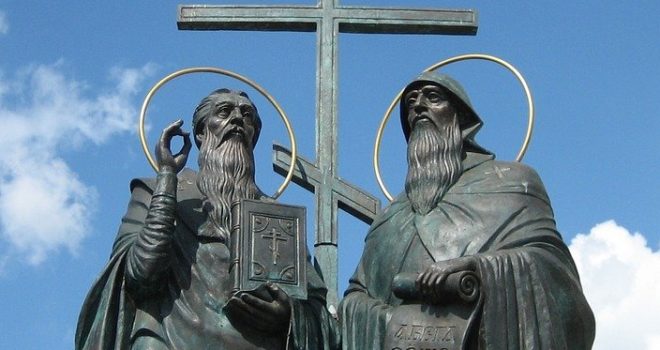Saints Cyril and Methodius
St. Cyril (827?-869) and St. Methodius (815?-885) were brothers who became famous as missionaries to the Slavic peoples of southeastern Europe. They were born in Greece, where their father served as an army officer in the Byzantine Empire. Cyril became a brilliant instructor at the imperial university in Constantinople, and Methodius served as governor of […]



St. Cyril (827?-869) and St. Methodius (815?-885) were brothers who became famous as missionaries to the Slavic peoples of southeastern Europe. They were born in Greece, where their father served as an army officer in the Byzantine Empire. Cyril became a brilliant instructor at the imperial university in Constantinople, and Methodius served as governor of one of the empire’s provinces. After some years, however, Methodius withdrew to a monastery. Cyril was offered the chance to take his brother’s place, but instead he followed his example and also became a monk.
Early in the 860s the Duke of Moravia asked the Emperor for political and religious independence from German rule, and this request — in spite of German opposition — was granted. Cyril and Methodius were sent to recruit local (non-Germanic) clergy and to establish a Slavonic liturgy. Cyril invented a Slavonic alphabet (possibly the source of the modern Russian alphabet), and he and his brother translated much of the Bible into Slavonic. Their great success as missionaries provoked envy and opposition from German religious and political authorities. When the local German bishop refused to consecrate Slavic clergy, the brothers traveled to Rome in 869 and appealed to Pope Adrian II. The pope upheld their authority and approved their liturgy; soon after this St. Cyril, who had long been ill, died.
Methodius was consecrated a bishop by the pope, and he spent the remaining years of his life in missionary activity, despite the continued opposition of his German colleagues. At one point he was forced into exile, and he was later summoned to Rome to defend himself against his opponents’ accusations. St. Methodius died in 885; he and St. Cyril are today honored by Catholics throughout southeastern Europe.
Lessons
1. Saints Cyril and Methodius represent the Church’s recognition of the importance and uniqueness of individual cultures. God is able to speak through every language and to every people.
2. Human jealousy can hinder and delay missionary activity, but not prevent it. As St. Paul noted, “There is no chaining of the word of God” (2 Tm 2:9).
Other Saints We Remember Today
St. Valentine (269), Priest, Martyr, Patron of Greetings and Lovers














